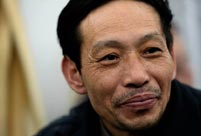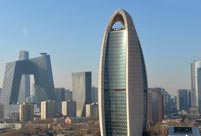 Cockfighting show staged in E. China's Heze during Spring Festival
Cockfighting show staged in E. China's Heze during Spring Festival
 Chinese New Year Flower Fair opens in San Francisco
Chinese New Year Flower Fair opens in San Francisco
 Festivities in Shanghai
Festivities in Shanghai
 PLA navy conducts drill in North China Sea
PLA navy conducts drill in North China Sea
 World's high-tech hotels
World's high-tech hotels
 Li Na poses with trophy on Brighton Beach in Melbourne
Li Na poses with trophy on Brighton Beach in Melbourne
 Six Chinese divers back safely after 300-meter saturation dive
Six Chinese divers back safely after 300-meter saturation dive
 Traditional wedding ceremony of Yao people
Traditional wedding ceremony of Yao people
 Taipei Game Show attracts geeky gamers
Taipei Game Show attracts geeky gamers
Two, adhering to and improving the basic economic system. The basic economic system with public ownership as the mainstay of the economy and economic entities of diverse ownership developing together is an important pillar of the socialist system with Chinese characteristics and is the foundation of the socialist market economy.
Since the introduction of the reform and opening-up policies in 1978, the structure of ownership has undergone gradual adjustment, with changing weight of public and non-public sectors in their contribution to the economy and employment. The economy and society grew more vigorous during the process. Under such circumstances, how to better recognize the dominant position of public ownership and stick to this position and how to further explore the effective forms for materializing the basic economic system have become major topics for us.
It is emphasized in the Decision that we must unswervingly consolidate and develop the public economy, persist in the dominant position of public ownership, give full play to the leading role of the state-owned economy, and incessantly increase its vitality, control and influence.
Adhering to and furthering the relevant deliberations made since the Party's 15th National Congress, the Decision proposes to vigorously develop a mixed economy. It stresses that a mixed economy with cross-shareholding by and blending of state-owned capital, collective capital and non-public capital is an important way to materialize the basic economic system of China. It helps to improve the functions of state-owned capital, increase its value and raise its competitiveness. This is an effective channel and inevitable choice for us to adhere to the dominant role of the public economy and improve its vitality, control and influence in the new circumstances.
The Decision states that China will improve the state assets management system, strengthen state assets oversight with capital management at the core, reform the authorized operation mechanism for state capital. State-owned capital investment operations must serve the strategic goals of the state, invest more in key industries and areas that are vital to national security and are the lifeblood of the economy, focus on offering public services, develop important and forward-looking strategic industries, protect the ecological environment, support scientific and technological progress, and guarantee national security. The government will transfer part of the state-owned capital to social security funds. We will increase the proportion of state-owned capital gains that are turned over to the public finance, to be used to ensure and improve the people's livelihood.
State-owned enterprises (SOEs) constitute an important force for advancing national modernization and protecting the common interests of the people. Through many years of reform, SOEs have generally assimilated themselves into the market economy. In the meantime, however, they have also found problems and drawbacks in their system, which calls for further reform. The Decision proposes a series of targeted reform measures: We must ensure that state-owned capital increases its input into public-welfare enterprises; in natural monopoly industries held by state-owned capital, carry out a reform focusing on separation of government administration from enterprise management and from state assets, franchise operation, and government oversight, separate networks from operations and decontrol competitive businesses based on the characteristics of different industries; improve the corporate governance structure with coordinated operations and effective checks and balances; establish a system of professional managers, and give better play to the role of business executives; establish a long-term incentive and restraint mechanism, and strengthen investigations into the accountability of SOE operations and investment; explore ways to publicize important information, including SOE financial budgets; and SOEs should appropriately increase the proportion of market-oriented recruitment, and rationally determine and strictly regulate the salary standards, position benefits, position-related expenses and business spending of SOE management personnel. These measures will stimulate SOEs to improve the modern corporate system, enhance their operating efficiency, better fulfill their social obligations, and play a better role in the economy.
We must adhere to the "two unswervinglies" in order to continue and improve our basic economic system. The Decision proposes reform measures on multiple levels to encourage, support and guide the development of the non-public sector of the economy, and to stimulate its vigor and creativity. On functional positioning, the Decision points out that both the public and non-public sectors of the economy are important components of the socialist market economy, and an important basis for China's economic and social development. On the protection of property rights, the Decision points out that the property rights of both the public and non-public sectors of the economy are inviolable. On policy treatment, the Decision stresses equal rights, opportunities, rules, and a unified market access system. The Decision encourages non-public enterprises to participate in the reform of SOEs, encourages development of mixed-ownership enterprises in which private capital holds majority shares, and encourages qualified private enterprises to establish a modern corporate system. All these will contribute to the healthy development of the non-public sector of the economy.


 A 60-hour journey home
A 60-hour journey home Int'l Snow Sculpture Art Expo
Int'l Snow Sculpture Art Expo Highlights of China's air force
Highlights of China's air force Airline crew stage flashmob dance at Kunming airport
Airline crew stage flashmob dance at Kunming airport Top15 countries to retire to in 2014
Top15 countries to retire to in 2014 Hot supermodel's new photo album released
Hot supermodel's new photo album released Asia's heaviest box girder finishes 'rotation' in Wuhan
Asia's heaviest box girder finishes 'rotation' in Wuhan Completed facade of People's Daily new headquarters
Completed facade of People's Daily new headquarters Chinese-branded car passes North America standard safety test for the first time
Chinese-branded car passes North America standard safety test for the first time Li Na beats Bouchard to reach Australian final
Li Na beats Bouchard to reach Australian final  Explore the sources of PM 2.5
Explore the sources of PM 2.5 Highlights of Chinese airborne troops'exercises
Highlights of Chinese airborne troops'exercises  'Living in ice house' competition held in central China
'Living in ice house' competition held in central China  Chinese figure in Oscar nominations
Chinese figure in Oscar nominations  Top ten aerospace events in China 2013
Top ten aerospace events in China 2013Day|Week|Month